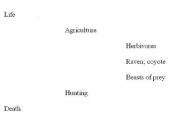According to Stephen Lazier, in the introduction to his new collection one could easily arrive at the impression that, in the discipline of anthropology as a whole, anthropology of religion is currently on the run. It is difficult to find programs that take anthropology of religion seriously where can one do graduate work, where can one find professors for whom religion is a primary concern? But in the post Cold War era, with rising levels of ethnic and religious conflict, the effects of religion, its impact on our social and political lives, have a greater visibility than at any time in the past twenty years. As Glazier and other evidence show, we may in fact be in a sort of Golden Age for the anthropology of religion-but not all the action is taking place inside the discipline of anthropology.
There was a time, in the nineteenth century, when anthropologists saw in religion an archaic mode of thought and action standing behind the modern programs of science, law, politics, and education that would one day drop away.
No anthropologists would say that with such certainty today, though problems of definition remain, as, often, depending upon how we identify it, what we see a the religious reaches into virtually every corner of human activity. Fundamentally then, the anthropology of religion must quite simply be seen as the application of the weight of anthropological theory and method to the analytical and social quandary of religion or religions-What is it? What are they? What do we speak of when we speak of "religion" and how does that relate to particular religions'? What makes religion? What does it do for us? Other disciplines ask the same or similar questions, but in anthropology the focus of the analysis is generally ethnographic. While in history of religion,



Excellent.
Excellent essay! I was impressed at the knowledge that you expressed in it.
3 out of 3 people found this comment useful.